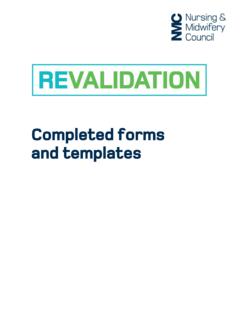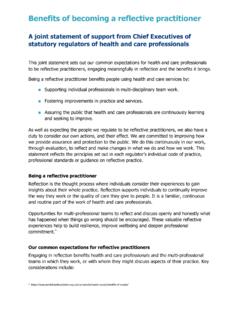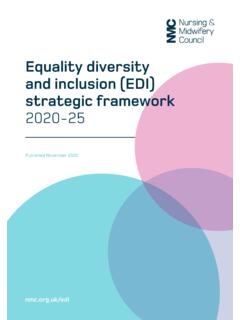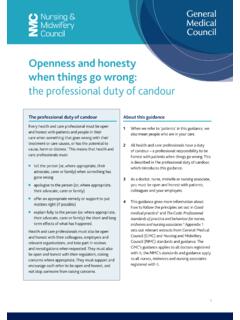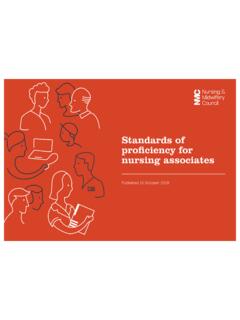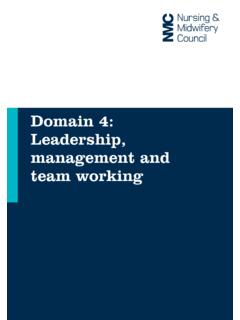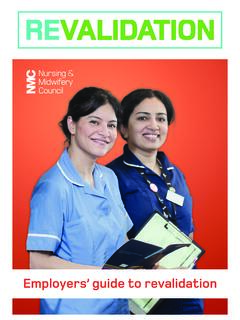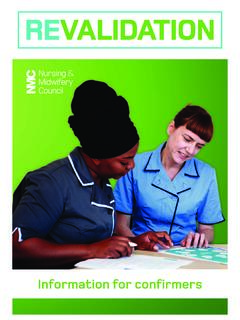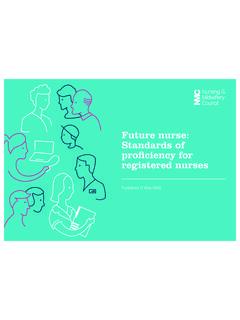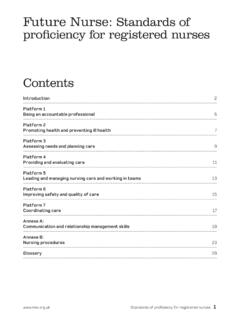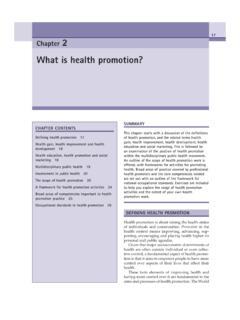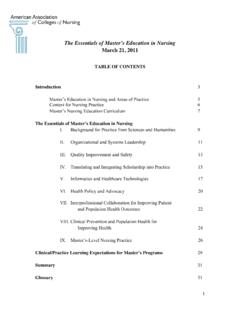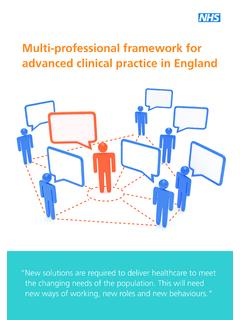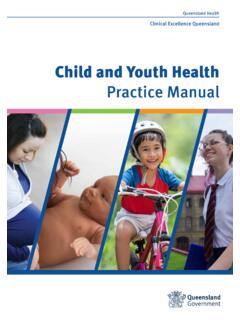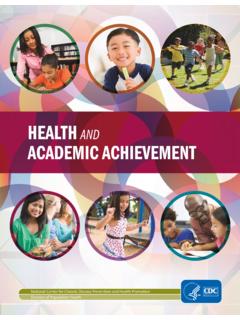Transcription of Standards for specialist education and practice
1 Standards for specialist education and practice This document is now the UKCC's exclusive reference document specifying Standards for specialist practice . Any previous documentation, as detailed below, relating to specialist practice is no longer applicable: The future of professional practice - The Council's Standards for education and practice following registration (March 1994). Registrar's letter 20/1994. Registrar's letter 9/1995. Registrar's letter 14/1996. Registrar's letter 15/1996. Registrar's letter 11/1998. These Standards remain current however please note: The UKCC is now known as the Nursing and Midwifery Council (NMC). References to the Code refer to the NMC Code 2015. Revalidation requirements replace post-registration education and practice (Prep) which ended on 31 March 2016.
2 The term 'handicapped' has been removed from this document in alignment with the Equality Act 2010 ( NMC 2015). Index Page 1 Introduction to post-registration education and practice (PREP). Page 3 Recording the qualification of specialist practice Page 5 Transitional arrangements: 1 November 1995 - 31 October 1998. Page 6 Preparation for specialist practice Page 9 Standards for specialist community nursing education and practice Page 13 Standards for specialist community nursing education and practice - general practice nursing Page 14 Standards for specialist community nursing education and practice - community mental health nursing Page 15 Standards for specialist community nursing education and practice - community learning disabilities nursing Page 16 Standards for specialist community nursing education and practice - community children's nursing Page 17 Standards for specialist community nursing education and practice - public health nursing/ health visiting Page 19 Standards for specialist community nursing education and practice - occupational health nursing Page 20 Standards for specialist
3 Community nursing education and practice - community nursing in the home/district nursing Page 21 Standards for specialist community nursing education and practice - school nursing Annexe 1 health visitor training rules Annexe 2 Parts of the UKCC register PSD/Poed/Admin/sped&pdoc April 2001. Introduction to post-registration education and practice (PREP). Post-registration education and practice Standards (PREP) comprise the following components: 1 Maintenance of effective registration The Standards relating to the maintenance of effective registration are laid down in Statutory Instrument 1995 no 976 and PREP and you (page 6) 1997. 2 Preceptorship Preceptorship is laid down in SLAIP. 3 specialist nursing practice 4 Return to practice The Standards relating to return to practice are laid down in Statutory Instrument 1995 no 967 and The PREP handbook 2001.
4 5 Advanced nursing practice Following a listening exercise to determine whether to set Standards for advanced practice , the UKCC made the decision in March 1997 not to set Standards ((CC/97/06) and Council minute 6/97 Professional Policy Affairs, Agendum 6). Therefore there are no Standards set for advanced practice . There is, however, an acknowledgement by the UKCC that all practitioners have the opportunity of advancing their practice . 6 Definition of specialist practice There is a clear difference between practising within a speciality and holding the UKCC recordable qualification of specialist practitioner. specialist practice is the exercising of higher levels of judgement, discretion and decision making in clinical care. 7 Such practice will demonstrate higher levels of clinical decision making and so enable the monitoring and improving of Standards of care through:- supervision of practice ; clinical audit; development of practice through research; teaching and the support of professional colleagues and the provision of skilled professional leadership.
5 8 specialist practice will require the exercising of higher levels of judgement, discretion and decision making, focusing on four broad areas: clinical practice ;. care and programme management;. clinical practice development and clinical practice leadership. This higher level of practice can be exercised in any area of health care delivery. The Standards to enable this are identified on page 9. In addition, the UKCC has determined specific community requirements (pages 13 to 22). Recording the qualification of specialist practice 9 As stated, specialist practice is the exercising of higher levels of judgement, discretion and decision making in clinical care. This exercising of a higher level of judgement is based on first level initial registration. Therefore, any practitioner wishing to record on the UKCC register the qualification of specialist practitioner must meet the following requirements:- An entry on the relevant and appropriate part of the register: Part 1 or12.
6 Part 3 or 13. Part 5 or 14. Part 8 or 15. Part 10. Nurses on part 2 (EN (G)), 4 (EN (M)), 6 (EN (MH)) or 7 (EN. SCOT/NI) of the register must have achieved the outcomes for first level registration as well as the outcomes for the specialist practitioner qualification in order to record the qualification. Have completed a period of experience of sufficient length to have consolidated pre-registration outcomes and to have gained a deeper understanding in relevant professional practice . Provide evidence that the specialist practice qualification is necessary for the assumption of higher order responsibility in clinical care and that it is relevant, required and responsive to health needs. Have completed a programme of preparation that is: at no less than first degree level (this equates with the final year of a degree course).
7 No less than an academic year (32 weeks minimum), full time or part time equivalent (including accreditation of prior learning) and made up of 50% theory and 50% practice . and founded on principles that offer: a common core of preparation and specific modules. The core modules shall consist of no less than one third and no more than two thirds of the total programme;. all modules having internal integrity and the capacity to be linked to other modules to form a coherent programme of learning;. flexible modes of delivery;. linkage to a higher education accreditation system and credit for appropriate prior learning and prior experiential learning. Transitional arrangements: 1 November 1995 - 31 October 1998. 10 It was agreed by the UKCC that the following would apply through a transitional period of introduction of specialist practice programmes.
8 Using the title - specialist practitioner In order to use the title of specialist practitioner, the practitioner will be required by the UKCC to: be on parts 1, 3, 5, 8, 9, 10, 11, 12, 13, 14 or 15 of the UKCC's register;. have a post registration clinical recordable qualification following a course of four months or more in length, or a recordable school nurse qualification;. relevant to your area of practice ;. have on record that you and your employer are confident that you have the skills and knowledge to practice safely and effectively as defined within The Code and have consolidated by appropriate experience your post registration recordable qualification. Recording the qualification - specialist practitioner In order to record the qualification of specialist practitioner, practitioners will be required by the UKCC to meet the requirement as laid down on pages 3 and 4.
9 The only exception to these requirements is that where no previous post registration clinical recordable qualification existed in the United Kingdom, it is then acceptable for the programme to be at diploma rather than degree level. For this and only this exception, the recording of the specialist practitioner qualification is acceptable. Otherwise the use of the title only is acceptable. Preparation for specialist practice 11 As stated earlier, the preparation for specialist practice will concentrate on four broad areas; clinical practice ; care and programme management; clinical practice leadership and clinical practice development. The practitioner should achieve the following outcomes in each area: Clinical practice assess health , health related and nursing needs of patients or clients, their families and other carers by identifying and initiating appropriate steps for effective care for individuals and groups.
10 Set, implement and evaluate Standards and criteria of nursing intervention by planning and providing and evaluating specialist clinical nursing care across a range of care provision to meet the health needs of individuals and groups requiring specialist nursing;. assess and manage critical and clinical events to ensure safe and effective care;. support and empower patients and clients, their families and other carers to influence and participate in decisions concerning their care by providing information on a range of specialist nursing care and services;. facilitate learning in relation to identified health needs for patients, clients and carers;. provide counselling and psychological support for individuals and their carers;. act independently within a multi-disciplinary/multi-agency context and support and empower patients, clients and their carers to influence and use available services, information and skills to the full and to participate in decisions concerning their care.
